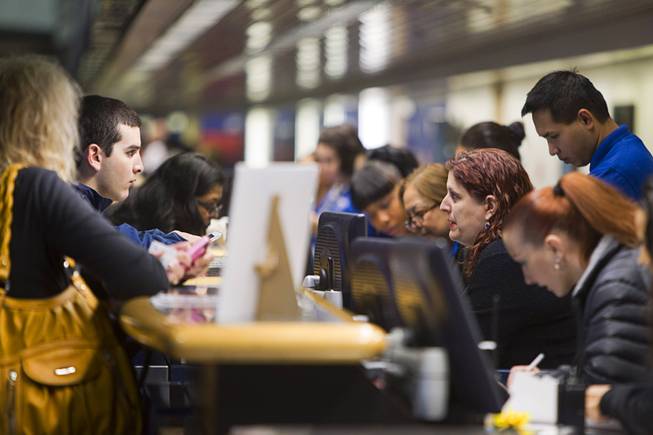
Travelers check in at the Allegiant Airlines counter Thursday, Oct. 30, 2014, at McCarran International Airport.
Monday, Oct. 16, 2017 | 2 a.m.
When you might find yourself flying standby
• If you miss your flight or connection
• If you arrive at the airport early and want to get on an earlier flight
• If your plans are flexible
• If you’re unsure about precise travel plans but want to take advantage of an available low price
• If you need to extend a trip
• If you need to return early from a trip
• If you know someone who works for an airline (see: buddy pass)
The hot seat
Some budget airlines charge for seat selection: If you don’t want to pay, you wait until check-in to find out where you’ll sit. This is NOT the same as standby; if you’re paying for a confirmed seat on the plane, you’ll get one.
"Wanna get away?" Southwest’s slogan, while catchy, isn’t always an option. Security restrictions, a wealth of booking choices, rewards programs and complicated fare classes all contribute to the difficulty of buying a last-minute plane ticket. If you find yourself needing to change your travel plans, whether by choice or circumstance, take heart in knowing that you have options other than buying an entirely new ticket.
HOW IT WORKS
1. Nowadays, to fly standby means to have an unconfirmed spot on a particular flight — if there are extra seats, you can board. In order to do so, you need to already have purchased a ticket to your intended destination. Some take a risk by buying the cheapest available ticket, then go to the airport earlier when they actually want to fly and trying to get a standby seat.
2. Do your research and know the policies of the airline you want to fly. Restrictions might include the following:
• Time restrictions: Many airlines allow you to cancel for free within the first 24 hours of purchase. You might also have a deadline: On Aeromexico, all changes must be made at least three hours before your original flight.
• Additional fees: Some will have you pay the fare difference or a flat standby fee. Others might allow passengers to standby for free for an earlier flight.
• Refund policies: If you purchase additional perks (extra legroom, first class, etc.), they might not be available on your new flight and you might have to forfeit what you’ve already paid.
• Missing out on points: Flying standby or on a discounted ticket might not be worth the same mileage value, if any. Additionally, flying on a buddy pass cannot be claimed as a business expense.
3. Remember that your place is not reserved and nothing is guaranteed. Standby priority is given as follows:
• Pilots and flight attendants en route to work.
• Full-fare passengers bumped from another flight.
• Full-fare passengers on standby for an earlier flight than their original ticket.
• Off-duty pilots.
• Other airline employees and family.
• Buddy pass travelers in order of time of check-in.
What is a buddy pass?
Airline employees are given a handful of discounted or free passes each year to use or give to friends and relatives. They’re not free guaranteed tickets, however, but an opportunity to fly standby. Here’s what to keep in mind if you’re on a buddy pass:
• When planning ahead, ask how full a flight typically is. The emptier, the better chance you’ll have to get seated.
• Be on your best behavior. By using an employee’s pass, you’re technically a representative of the company. Some airlines have dress codes, which might prohibit wearing shorts or T-shirts.
• Though you’ll get a steep discount, you might still have to pay taxes and fees on the value of the ticket.
Tips
• Don’t check a bag. If you don’t end up making it on, your bags risk leaving without you. Pack light in a carry-on or ask an agent if you can check your bag at the gate.
• Arrive as early as possible. Standby passengers are usually given priority in the order they check in. Don’t risk being the cut off by cutting it too close.
• Avoid popular travel times. It’s going to be hard to find extra seats on a busy holiday weekend, for example, when you’ll also deal with larger crowds and security lines.
• Check to see how often an airline flies to your destination. Some, like Allegiant, have a limited schedule. If you miss your flight, you might have to wait several days for the next one.
TIP: The likeliest way to success is standing by for an earlier flight — you always fall back on your original ticket if you don’t make it on.
• Stay at the gate. Make sure you let the agent know you’re there. If you miss an announcement, you might lose your spot in line.
• Be patient and polite. Check-in attendants and gate agents are working within their company’s parameters to help you, so don’t badger them.
• Wait until the plane has actually left the gate to give up. You never know when you might get lucky!

Join the Discussion:
Check this out for a full explanation of our conversion to the LiveFyre commenting system and instructions on how to sign up for an account.
Full comments policy